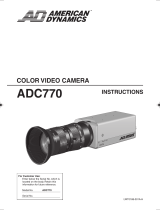
2
1.
Read all of these instructions.
2.
Save these instructions for later use.
3.
4.
5.
6.
7.
8.
9.
10.
IMPORTANT SAFEGUARDS
PORTABLE CART WARNING
(symbol provided by RETAC)
S3125A
Unplug this appliance system from the wall outlet before cleaning. Do
not use liquid cleaners or aerosol cleaners. Use a damp cloth for
cleaning.
Do not use attachments not recommended by the appliance
manufacturer as they may cause hazards.
Do not use this appliance near water - for example, near a bathtub,
washbowl,kitchen sink, or laundry tub, in a wet basement, or near a
swimming pool, etc.
Do not place this appliance on an unstable cart,
stand, or table. The appliance may fall, causing
serious injury to a child or adult, and serious damage
to the appliance.
Use only with a cart or stand recommended by the
manufacturer, or sold with the appliance. Wall or
shelf mounting should follow the manufacturer's
instructions, and should use a mounting kit approved
by the manufacturer. An appliance and cart
combination should be moved with care.
Quick stops, excessive force, and uneven surfaces
may cause the appliance and cart combination to
overturn.
Slots and openings in the cabinet and the back or bottom are provided
for ventilation, and to insure reliable operation of the appliance and to
protect it from overheating, these openings must not be blocked or
covered. The openings should never be blocked by placing the
appliance on a bed, sofa, rug, or other similar surface.
This appliance should never be placed near or over a radiator or heat
register.
This appliance should not be placed in a built-in installation such as a
bookcase unless proper ventilation is provided.
This appliance should be operated only from the type of power source
indicated on the marking label. If you are not sure of the type of power
supplied to your home, consult your dealer or local power company.
For appliance designed to operate from battery power, refer to the
operating instructions.
For added protection for this product during a lightning storm, or when
it is left unattended and unused for long periods of time, unplug it form
the wall outlet and disconnect the antenna or cable system. This will
prevent damage to the product due to lightning and power-line surges.
These are general IMPORTANT SAFEGUARDS and certain items may
not apply to all appliances.
All warnings on the product and in the operating instructions should be
adhered to.
FOR USA
3
16.
a. When the power cord or plug is damaged or frayed.
b. If liquid has been spilled into the appliance.
c. If the appliance has been exposed to rain or water.
d.
e. If the appliance has been dropped or the cabinet has been damaged.
f.
17.
18.
If the appliance does not operate normally by following the
operating instructions. Adjust only those controls that are covered
by the operating instructions as improper adjustment of other
controls may result in damage and will often require extensive work
by a qualified technician to restore the appliance to normal
operation.
13.
14.
15.
Never push objects of any kind into this appliance through cabinet slots
as they may touch dangerous voltage points or short out parts that
could result in a fire or electric shock. Never spill liquid of any kind on
the appliance.
Do not attempt to service this appliance yourself as opening or
removing covers may expose you to dangerous voltage or other
hazards. Refer all servicing to qualified service personnel.
Unplug this appliance from the wall outlet and refer servicing to
qualified service personnel under the following conditions:
When the appliance exhibits a distinct change in performance - this
indicates a need for service.
When replacement parts are required, be sure the service technician
has used replacement parts specified by the manufacturer that have
the same characteristics as the original part. Unauthorized
substitutions may result in fire, electric shock, or other hazards.
Upon completion of any service or repairs to this appliance, ask the
service technician to perform routine safety checks to determine that
the appliance is in safe operating condition.
Do not overload wall outlets and extension cords as this can result in
fire or electric shock.
11.
12.
Follow all warnings and instructions marked on the appliance.
Do not allow anything to rest on the power cord. Do not locate this
appliance where the cord will be abused by persons walking on it.





















